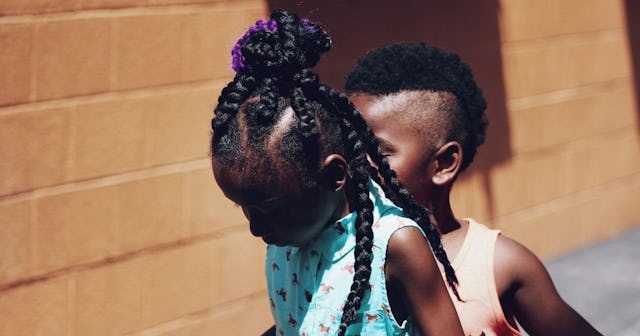It Is Important To Me That My Black Son Have Black Friends

“Hey! Your hair looks like mine,” my son’s new friend exclaimed.
“Yes!” my son responded, touching his hair, even though I’m not completely sure he understood exactly what his friend meant.
My son is three and he doesn’t discriminate when picking his friends. But that doesn’t mean that he isn’t old enough to notice that hardly anyone out here looks like him. Hearing them go back and forth about their similarities of hair and skin tone reminded me of that.
My son hadn’t ever had a friend with hair like his. They both had kinky textured plaits, a style common for Black children but less common for young Black boys.
Muhammadtaha Ibrahim Ma’aji/Pexels
He’d met plenty of my friends’ kids — mostly white and a handful bi-racial — and had great fun laughing and playing with them. But playing with someone who looked so much like him was something he wasn’t used to. This is his first Black friend.
For some reason, my eyes started to water.
Perhaps it was seeing my son’s brown skin next to a hue so similar to his own, other than his family members, for the first time ever. Or maybe it was having met another Black family who decided to go against social customs and avoid cutting their son’s hair. Or maybe it was because we had more in common than any parent I’d ever gotten to talk to since moving away from hometown. It was a good feeling. And after looking at the smile on my son’s face as his new friend mentioned his hair, I think he might have been comforted too.
It’s hard raising Black children in the Midwest. And more often than not, the other Black children he meets can pass for white because of their mixed race. Their struggles are similar but not identical to what our family experiences with two Black parents and two Black children.
So I sat there watching them play and run in our backyard and for the first time that I can ever remember, it didn’t feel like my heart was about to beat out of my chest. I wasn’t afraid of him being misunderstood or being asked questions about his hair texture or skin color. For the first time, I felt safe.
I sat there listening to their high-pitched screams, silly giggles, and felt relaxed enough to track the pace of the wind. Typically, I was on high alert when he interacted with friends. But this time, it felt simple. I recognized a similar peace on my friend’s face. Neither of us was accustomed to letting go and allowing our boys to be carefree and unrestricted.
Samantha Hurley/Burst
Little Black children don’t get to be free in this society. Every breath they take has the potential for lifelong consequences if done in a “suspicious” manner. I was used to living life ready to jump to his rescue at a moment notice.
As we watched our boy run, we thought about how terrifying it is to be Black in public. In another setting, these everyday behaviors – running and screaming – would be a reason to call the authorities.
Should they step out of line, the consequences are too heavy to bear.
It’s hard not to think of stories, like that of Dravon Ames and his fiancee, Iesha Harper, whose four-year-old daughter was held at gunpoint for “stealing” a doll from the dollar store. The consequences for normal childhood milestones are tenfold when developing while Black.
So that moment when we met another Black family was simple yet indescribably powerful and both of us knew it.
Where else would our Black sons be allowed to run, disagree, and scream aloud without arousing the scrutiny?
Anissa Thompson/FreeImages.com
I sat there thinking about the millions of Black families, like the single-parent home I grew up in, that had no yard for their children to experience freedom. My backyard now is a place of refuge and it hurt to imagine a world without that.
We’ve been fortunate. Somehow, we overcame many of the hurdles aimed to limit our success. I regularly wonder why we had the chance to graduate from an air mattress in my mom’s living room to a three-bedroom house and a corner lot. It doesn’t seem fair that we moved, while so many people I grew up with are stuck with no place for their children to run free.
Our fenced backyard is symbolic of the wall of protection I fight for in my children’s lives. I want them hidden and safe, but I also want them to be free. As an anxious Black mother, I’d always felt the best way to give Black children freedom was to isolate them. I’m working to expand the space he has to roam, but I hesitate for good reason.
My friend and I discussed this, and similar pressures we must protect our children from. In the silence, I think about the permissive parent I’d love to be if letting go of the reins didn’t have the risk of costing my son his life. Next, I envision a world where Black children and therefore Black parents could be free-range and free-minded in the way we live our lives.
But right now, all I have is the four corners inside our fenced-in yard. And if my house has to be the place where Black families can feel free to exist without fear, I’m fine with that. And if it comes with my son’s first Black friend, even better.
This article was originally published on